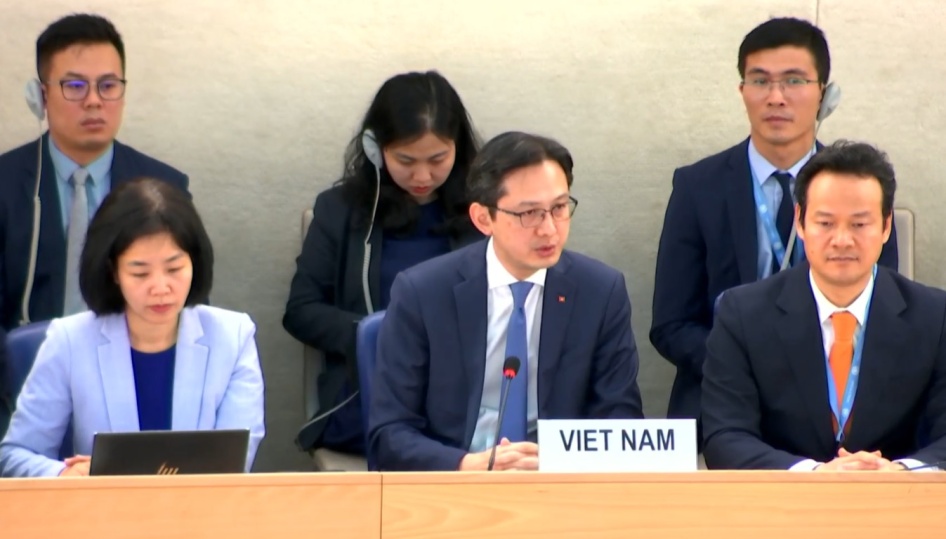(Washington) – Vietnam is providing false or misleading information to the United States and other economic partners to secure or maintain preferential trade preferences, Human Rights Watch said today.
The US Department of Commerce held a public hearing about Vietnam’s trade status on May 8, 2024. The US government is currently considering a reclassification of Vietnam under the US Tariff Law as a “market economy,” which would provide Vietnam major economic benefits, even though Vietnam does not satisfy basic labor rights standards.
In arguing for the reclassification of its economy under US law, the Vietnam government contends that its labor law standards are in line with international standards and that workers’ wages in Vietnam are “determined by free bargaining between labor and management,” as called for under applicable US standards. US officials are set to rule on the issue in July.
“It’s patently false to claim that Vietnamese workers can organize unions or that their wages are the result of free bargaining between labor and management,” said John Sifton, Asia advocacy director at Human Rights Watch. “Not a single independent union exists in Vietnam and no working legal frameworks exist for unions to be created or for workers to enforce labor rights.”
Human Rights Watch takes no position on Vietnam’s economic status, but the redesignation is legally contingent on basic labor rights protections and stated US policy on promoting labor rights. The US Congress should hold hearings on the topic and act to ensure that Vietnam’s record is properly reflected in the decision-making process. The European Union, which reached a free trade agreement with Vietnam in 2020, in part contingent on Vietnam’s pledges on labor rights, should initiate a review of its compliance.
In determining whether to classify a country as a nonmarket economy, US law requires consideration of six factors, including how tightly its government controls natural resources, prices, currency exchanges, and other factors, including, “the extent to which wage rates in the foreign country are determined by free bargaining between labor and management.”
As a matter of law and practice, Vietnam does not allow independent unions to represent workers. Chapter 13 of Vietnam’s 2021 labor code provides for “enterprise-level worker organizations,” and its Trade Union Law provides for “trade unions” as well as “worker representative organizations,” a term that appears in both laws. However, Vietnam’s Trade Union Law only allows government-controlled “unions.” The labor code still requires implementing regulations to be issued for the law to go into force. And no enterprise-level worker representative organizations exist in Vietnam.
“Vietnam’s claims to respect labor rights relies on empty words and promises, laws and regulations that have no connection to the realities of the county’s actual labor rights situation,” Sifton said.
At the same time, the Vietnam government continues to call the government-led Vietnam General Confederation of Labor (VGCL) a “labor confederation” of enterprise-level “labor federations.” But the VGCL is led by Vietnamese government appointees. The “unions” and “federations” that exist under the VGCL are almost all led by people appointed by management at the enterprise level. Workers or labor leaders do not choose leaders or representatives who can bargain to set wages on their behalf. Insofar as the VGCL does bargain with management or at the state-wide level, it does so in the interests of the government and the Vietnamese Communist Party, not on behalf of workers and not in a representative capacity.
The dynamic of state control of the VGCL has been further demonstrated by new information about a recent directive issued by the Communist Party of Vietnam, “Directive 24,” which orders enhanced scrutiny of labor groups, civil society, and foreign organizations, specifically in the context of Vietnam’s implementation of new trade agreements with other countries and with the International Labour Organization.
Directive 24, issued in July 2023, is intended to clarify the control of the government and party over the implementation of all new labor regulations and laws, noting that the “implementation of trade agreements has created new difficulties and challenges for national security.” The directive references orders that prohibit independent labor unions from operating in Vietnam, and states that all unions must be affiliated with the government and Communist Party of Vietnam. It instructs the government to take: “active initiative” in “piloting” labor organizations and in implementing labor standards to “ensure the ongoing leadership of the Party, leadership of party cells, and government management at all levels.”
Multiple sources told Human Rights Watch that in late April, Vietnamese police arrested Nguyen Van Binh, a senior official in Vietnam’s labor ministry who had advocated for more meaningful labor reforms and some independence of trade unions.
Numerous articles in state-run media reflect the Vietnam government’s hostility to independent labor organizations or unions, calling them “hostile forces” that use “plots and tricks” to “oppose the Party and the State… causing social disorder and hindering the lives of laborers in our country,” or arguing that the purpose of “so-called independent trade unions” is to “form a domestic oppositional political force, proceeding to carry out a ‘color revolution’ or ‘street revolution’ to overthrow the Communist Party and eliminate the political regime in Vietnam.”
“Vietnam is a closed society with an authoritarian government hostile to labor rights,” Sifton said. “Workers cannot openly organize, let alone bargain with management. The US government should recognize this.”








